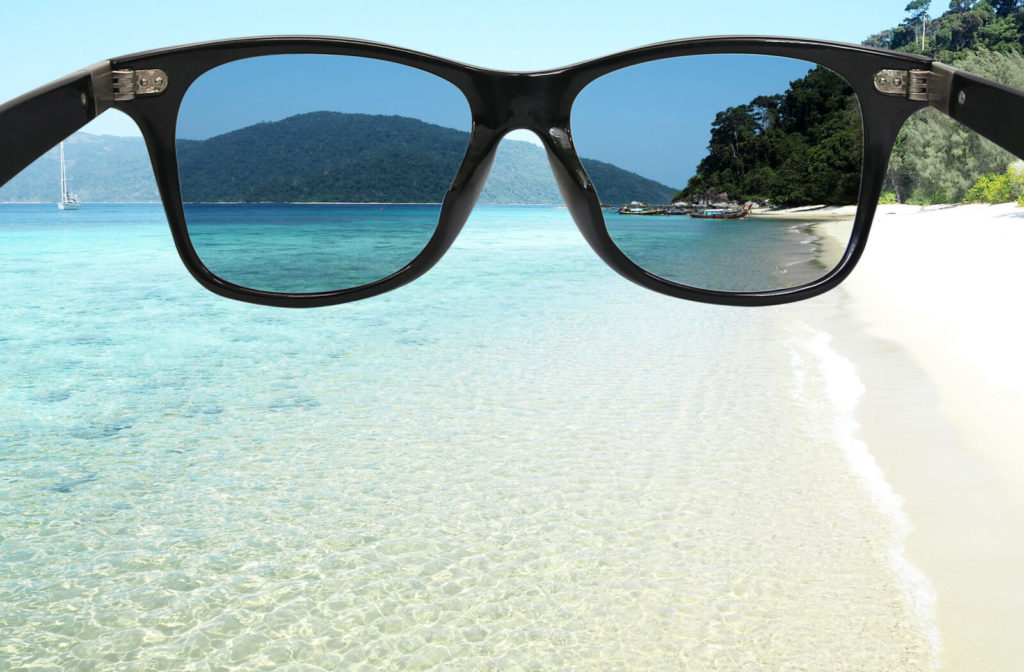Who doesn’t like a pair of cool sunglasses? Sunglasses are more than a style statement though, they also reduce glare and, if listed, can protect against harmful ultraviolet (UV) rays.
So, if you love to spend time outdoors, polarized sunglasses are worth it as they help reduce glare and eyestrain, improve your vision, and support eye health.
How Do Polarized Lenses Work?
You need light to see, but not all light that enters your eyes is good for you. Glare is light that interferes with your vision.
Polarized lenses can protect your eyes from certain types of glare. They work by blocking intense glare caused by light reflecting off of surfaces such as water or other reflective surfaces.
Polarized lenses have a special filter lined up in a certain way to block light. Only vertical light waves pass through the lens while blocking horizontal light waves because glare is typically horizontal light. It can improve visibility and contrast in bright conditions.
Advantages of Polarized Sunglasses
Polarized sunglasses can be worth it for certain activities or environments where bright sunlight is a problem, such as when light reflects off water, snow, or shiny surfaces. Advantages of polarized sunglasses include:
- Reduced glare: for better visibility.
- Improved contrast: enhance contrast and make it easier to see details in bright conditions.
- Reduced eye strain: glare can cause eye strain, and by reducing glare, polarized lenses can help to reduce eye fatigue and make it easier to focus on a task.
- Increased safety: polarized lenses can make it safer to drive a vehicle or boat, or engage in other activities that require good visibility.
- Minimal color distortion: improve the ability to see true colors.
- UV protection: not all polarized sunglasses come with UV protection. Polarized sunglasses with UV protection shield your eyes from harmful UV rays, which can cause damage to your eyes.

Who Can Benefit from Polarized Sunglasses?
Polarized sunglasses work well when reducing glare and improving visibility are a priority. Some common situations where polarized sunglasses can be beneficial include:
- Driving: glare from the sun and other cars can make it difficult to see on the road.
- Fishing and boating: bright sunlight reflecting off the water can make it difficult to see fish or other underwater objects. Polarized sunglasses can cut the glare and reduce eyestrain.
- Sports: polarized sunglasses make running and cycling more comfortable and safe.
- Golf: polarized lenses can reduce glare on fairways and help you find golf balls that fall into water hazards much easier.
- Snowy environments: the glare caused by the sun reflecting off the snow can make it difficult to see. Exposure to UV reflections off of snow and ice can cause snow blindness.
- Beach and water activities: polarized sunglasses help to prevent snow blindness, which can also result from exposure to UV reflections off sand or water.
How Do You Recognize Polarized Sunglasses?
There are a few ways to find out if sunglasses are polarized. Most polarized sunglasses will have a label or mark indicating they are polarized.
Other ways include looking at a reflective surface with and without the lenses: you should notice a reduction in glare and an increase in contrast. When held in front of an LCD screen, polarized lenses should cause it to appear dark and more difficult to see.
When Not to Wear Polarized Sunglasses
While polarized sunglasses can be beneficial in many situations, there are certain activities or conditions in which they may not be the best choice:
- Low-light conditions: because of filtering, polarized lenses are a bit darker and can reduce the amount of light that enters the eyes. It can make it harder to see in dimly lit conditions, such as when driving at night or skiing in overcast conditions.
- Snow sports (sometimes): snow can reflect a lot of light, which can cause glare. However, sometimes this is needed to help detect icy patches in the snow. Polarized lenses can make it harder to see these patches when skiing.
- LCD screens: polarized lenses are not ideal for liquid crystal display screens as they make it harder to see. These can include car dashboard controls, ATM cash machines, cell phones, and some watches.
- Flying: polarized lenses can make it difficult to see important instruments and reduce visibility through an aircraft windscreen. This can be a serious safety hazard for pilots.
- Sensitivity: polarized sunglasses aren’t good for those sensitive to how the lenses change the lighting.
If polarized sunglasses are not suitable for you because of your work, you can try one of these options:
- Anti-reflective coating available for sunglasses.
- Mirrored sunglasses to decrease how much light enters your eyes.
- Photochromic lenses, which automatically darken when exposed to a certain amount of light.
Protection from Sun & Glare
Polarized lenses are often worth it, especially if you’re an outdoor enthusiast. It’s important to remember that not all polarized sunglasses come with UV protection.
If you’re having trouble finding a quality pair of sunglasses with protection against glare, contact us at Total Vision Solana Beach or book an appointment to browse our selection of sunglasses.



